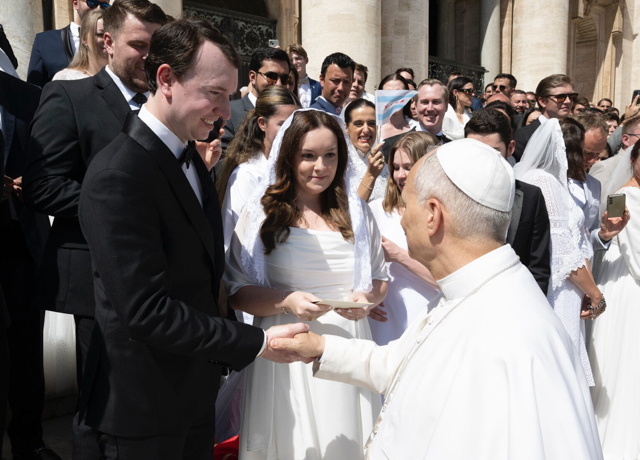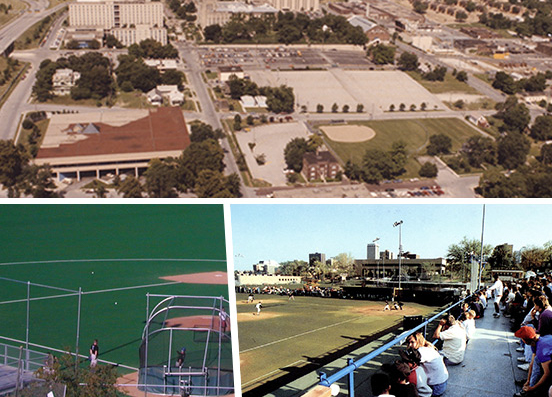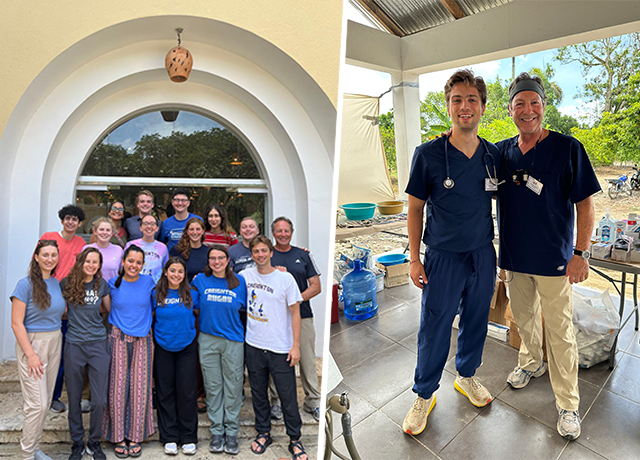Featured Testimonial About Creighton University
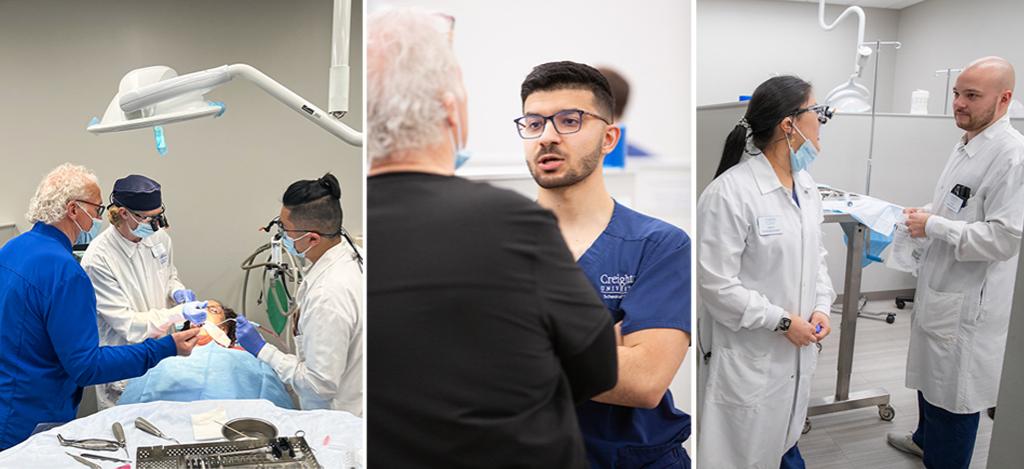
“We never turn away anyone in pain. If they don’t have the money, we’re still helping them. Thanks to our donors, we have funding available for our patients who need a little extra help.”
The School of Dentistry’s After-hours Clinic is open Tuesdays and Thursdays from 5:30 to 8:30 p.m. at 2109 Cuming St. Patients can make an appointment at 402-280-5031.
* * *
By Micah Mertes
Omahan Michelle Lucius’ mouth hurt for three weeks before she sought care.
When she finally did go to the Charles Drew Health Center, they told her she had a tooth that needed to be pulled, but it was too close to the nerve for them to extract. Lucius had a few options:
- She could go to the emergency room, where she would likely wait for six to eight hours to be seen — the average wait time for noncritical dental infections in the ER — then be prescribed an antibiotic and potentially a painkiller until she could schedule a dental appointment. (Emergency room dental care costs the state of Nebraska about $10 million every year.)
- She could go to an emergency dental service, which would cost her more than she could afford.
- Or she could go to the After-hours Clinic — a new service at Creighton’s School of Dentistry offering acute tooth extractions two nights a week.
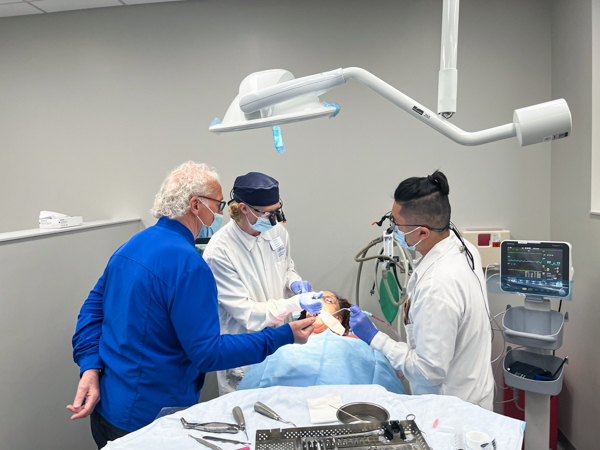
Lucius chose the third option. Within an hour, she was in a chair in the dental school’s After-hours Clinic (which serves as the oral surgery clinic during regular business hours).
Fourth-year dental student Dakota Baker prepared the procedure. He pointed to the X-ray of Lucius’ mouth, highlighting the source of her pain. A carious lesion had broken the tooth down past the point of saving.
A short while later, Baker — working with his fellow D4 Peter Liang, BS’20, and their professor, Terry Lanphier, BS'78, DDS'82, MBA'10, chair of oral and maxillofacial surgery — had removed the tooth and sent Lucius on her way. Her bill was less than $100. Elsewhere, simple or surgical extractions can cost two to five times that.
“I have to get back home because I have a baby with medical needs,” Lucius said. “Our family is completely strapped for time and money, so it was nice to find a place that was convenient and inexpensive and could give me everything I needed in one evening. In one hour, actually.
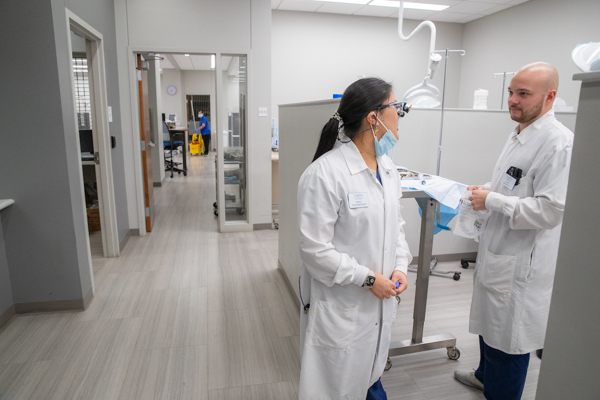
“I’m so grateful this place exists.”
‘We never turn away anyone in pain.’
At the School of Dentistry’s After-hours Clinic — which opened in August — fourth-year dental students extract (and sometimes save) the teeth of patients in pain.
An earlier iteration of the clinic launched in 2019 with the support of local philanthropic organizations the Lozier Foundation, the Willa D. Seeman Charitable Fund and the William and Ruth Scott Family Foundation.
When the After-hours Clinic went on hiatus during the pandemic, it gave the dental school a chance to refine the clinic’s staffing and operations. Now, thanks to community health improvement funds from UnitedHealthcare, the clinic looks to continue expanding its scope of service.
From 5:30 to 8:30 every Tuesday and Thursday evening, a trio of students, a group of faculty and staff, and a University of Nebraska Medical Center oral and maxillofacial surgery resident run the After-hours Clinic.
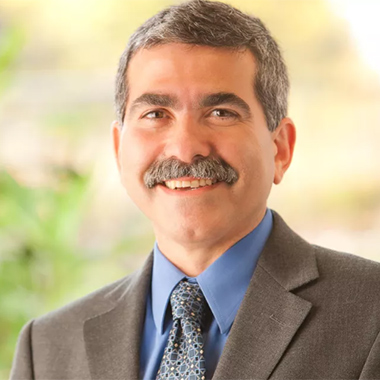
The dental school’s partnership with UNMC oral and maxillofacial surgery residents goes back decades. It started in large part because of a Creighton alumnus and former faculty member. Val Desa, DDS’92, MD — now an associate professor, division chief and residency director in UNMC’s oral and maxillofacial surgery program — helped to establish the Creighton rotation in 2002, when he was a UNMC medical resident himself.
“I’m proud to be an alumnus of Creighton’s dental school,” Desa said. “The school’s values have always been centered on making an impact by caring for others. It isn’t lip service. Creighton instills in its students the value of taking care of the underserved in the community. The After-hours Clinic is an excellent example of this.
“This clinic allows its patients to get a problem taken care of now and for a very reasonable cost. It's filling a huge need for the community.”
Steve Higgins, one of the UNMC residents overseeing the clinic’s Creighton students, said that “people are coming in to get the care they need on the schedule that works for them. Creighton students are getting great additional experience. And Nebraska residents like me get to come here and teach and be a part of something meaningful for the community. This benefits everyone.
“It’s already helped so many people, and we’re just getting started.”
The After-hours Clinic takes about 10 referrals, appointments or walk-ins each night, though that number grows as word of the clinic spreads throughout Omaha emergency rooms and urgent care clinics.
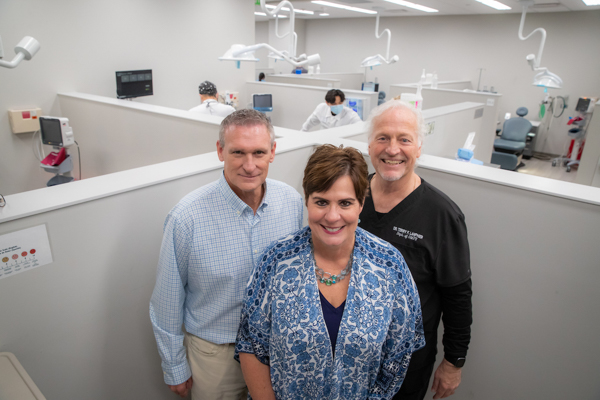
“We never turn away anyone in pain,” said Joseph Franco, BA'80, DDS'84, the School of Dentistry’s associate dean of clinical services. “If they don’t have the money, we’re still helping them. Thanks to our donors, we have funding available for our patients who need a little extra help.”
For those who can pay for the tooth extractions, the After-hours Clinic fees are 40 to 60% lower than the patient would pay at a private clinic. The same rate applies at the School of Dentistry's main daytime clinic, which serves about 14,000 patients with about 50,000 visits every year.
“If the dental care someone needs costs too much, they won’t get it done, and the delay in care will only lead to more pain and more problems later on,” said Marjel Whitmore, the dental school’s senior director of operations. Whitmore runs the After-hours Clinic with professors Franco and Lanphier.
The low cost and high accessibility of the After-hours Clinic, Whitmore said, removes the barriers to care and takes some of the pressure off the area’s emergency rooms.
According to a 2019 report on hospital emergency department use for non-traumatic dental conditions, ER dental care is costing the state of Nebraska about $10 million every year. The majority of patients seeking dental care in the ER are women, ages 18 to 45, uninsured or underinsured.
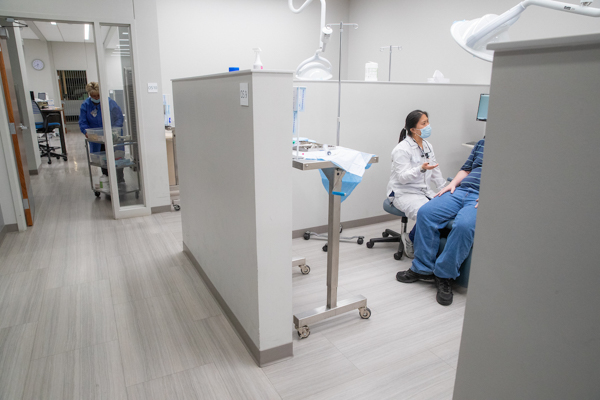
The After-hours Clinic is another essential part of the School of Dentistry’s comprehensive effort to address this problem — the emergency diversion program, which redirects patients seeking acute dental care in the ER to dentists who can help them as soon as possible.
The emergency diversion program gets at the root of the issue for all parties involved, said School of Dentistry Dean Jillian Wallen, BDS.
It alleviates the burden placed on Omaha providers, offers an accessible, affordable service for patients with limited means and, in the process, provides Creighton dental students with the invaluable experience of extracting teeth, working with patients and serving the community.
“The After-hours Clinic is a great opportunity for us to care for the whole person,” said Wallen. “It’s also a new way for our students to understand population health, to ask questions like …”
- Why are so many patients seeking dental care in an emergency room instead of a dental office?
- How do we provide more equitable access to healthcare?
- How can we most effectively take Creighton’s value of cura personalis into the communities we serve?
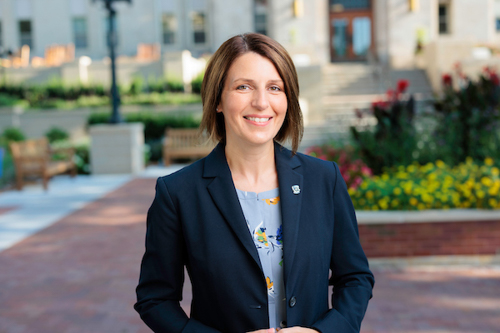
Service, Wallen said, isn’t only about helping people; it’s about genuinely connecting with them so you can better understand how best to serve their community. That’s something the School of Dentistry stresses with its students on day one.
“One of the things I see again and again," Wallen said, "is dental alumni choosing to live the values of service they developed at Creighton across the entire life of their careers.
“This school has a great legacy of excellence through service, and I’m excited for us to continue developing ways for our students to give back to our communities while, at the same time, becoming the best in their fields.”
The service is the education.
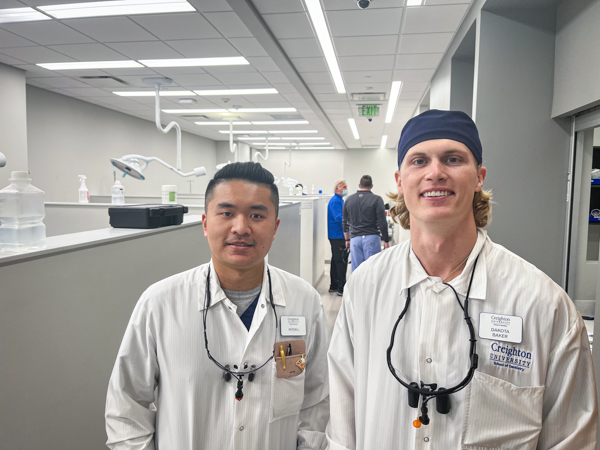
Fourth-year dental student Peter Liang has volunteered for the majority of the After-hours Clinic sessions so far. He joined the clinic to improve his skills in oral surgery. What better venue to hone them than an after-hours clinic specializing in acute tooth extractions?
“We have more autonomy here as students than we do at the main dental clinic,” Liang said. “At the main clinic, we’re learning the procedures. Here, we have the freedom to do things on our own more and to improve our skills in a different way.”
On this particular evening at the After-hours Clinic, associate professor Lanphier and Nebraska resident Higgins roamed the clinic floor, shifting from operatory to operatory to assist the students — which, in addition to Liang, included his fourth-year classmates Dakota Baker and Sharon Hung.
Lanphier said that rather than directing the students’ care of patients, professors and residents assess each situation and help when needed.
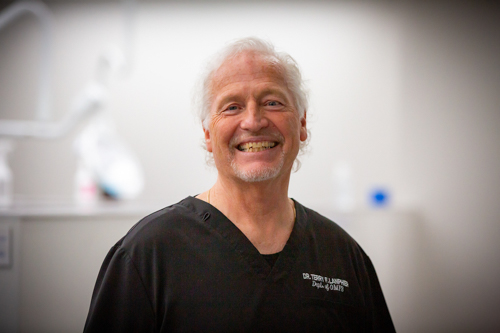
These fourth-year students — having already cut their teeth under the more intensive oversight of the daytime dental clinic — are ready to act with more independence, not only in the technical skills of tooth extraction but in the humanistic bonds they’re forming with patients.
At one point in the evening, one of Baker’s patients grew anxious during her tooth extraction. He immediately comforted her and figured out how he could help — by opening up her field of vision so she could better see the steps of the procedure.
“I’m still figuring out how to transfer what I’m learning in class to take care of the patients themselves,” Baker said. “At the clinic, I get to build up those skills with every new patient I see. I get to discover the right ways both to get them out of pain and break down the information and help them understand the procedure. It’s a great way to get in the reps of helping people.”
When it comes to gaining competence and confidence in any healthcare profession, but especially in dentistry, the three most important words are …
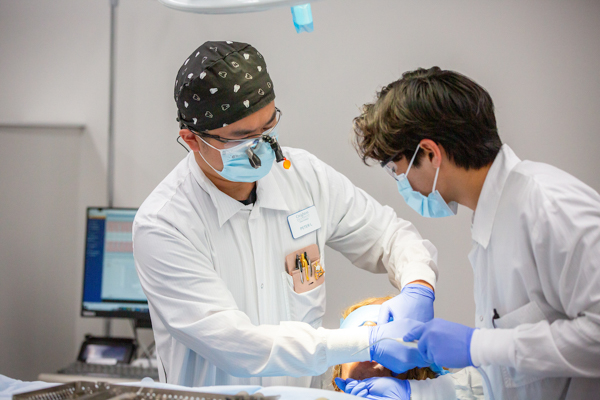
Repeat, repeat, repeat.
Very few people are going to execute something flawlessly or even adequately on their first try. (Or, for that matter, on their second, seventh or 10th try.)
“The more you do, the more patients you see, the better you get,” said Franco, associate dean of clinical services. “Because the School of Dentistry doesn’t have a residency program, we can offer so much more for our predoctoral students. They graduate as some of the most experienced in the country.”
Franco used extractions as an example. At some other dental schools, students will have done between three and five extractions before they graduate. Creighton students will have each done about 90.
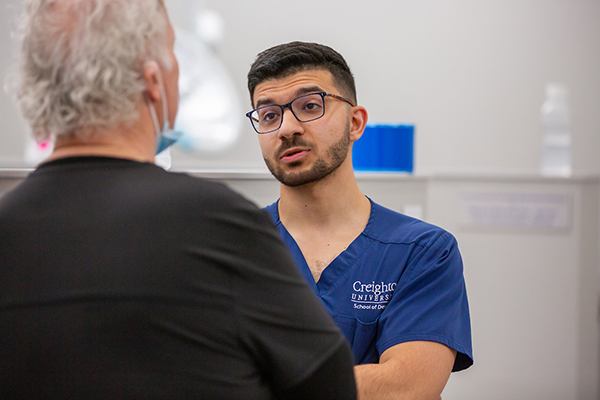
With more a semester left, fourth-year dental student Yousef Ashour, BS’20, has already done more than 200 extractions.
“Students at most other dental schools aren’t doing what we’re doing,” Ashour said. “They’re not assisting with a root canal on a back tooth or placing implants or removing wisdom teeth. That would be something a resident would do.
“But at Creighton, we’re the ones working alongside our awesome professors. We’re the ones learning how to do the really complicated stuff and to deliver the excellent quality of care Creighton’s dental clinic is known for.”
For as complex as the profession of dentistry is, the core distinguishing factor of a Creighton dental degree can be understood immediately:
The more patients our students help, the better dentists they become.
The service isn’t siloed from the education. The service is the education.
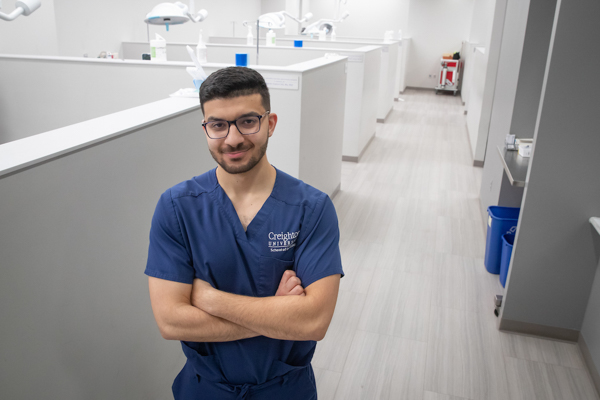
“I was a Creighton undergraduate before I was a dental student, and I’ve done a ton of Schlegel Center Service & Justice Trips,” Ashour said. “I knew I wanted to continue that in dental school, and I would say that’s one of the main things that sets this school apart. There are so many opportunities to serve.”
Ashour signs up for every After-hours Clinic session he can. He’s only missed a few evenings since the clinic opened in August, and he plans to make it to dozens more before he graduates next spring.
Some nights, Ashour will extract more teeth (and care for more patients on his own) than other dental students at other dental schools will in their full four years of dental education.
* * *
Want to learn more about the ways the School of Dentistry is filling a need in community care? Read about the dental school’s Extramural Education Program.
